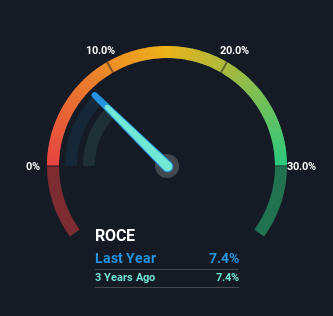- Romania
- /
- Specialty Stores
- /
- BVB:AG
Be Wary Of Agroland Business System (BVB:AG) And Its Returns On Capital

Did you know there are some financial metrics that can provide clues of a potential multi-bagger? One common approach is to try and find a company with returns on capital employed (ROCE) that are increasing, in conjunction with a growing amount of capital employed. Ultimately, this demonstrates that it's a business that is reinvesting profits at increasing rates of return. However, after investigating Agroland Business System (BVB:AG), we don't think it's current trends fit the mold of a multi-bagger.
Return On Capital Employed (ROCE): What Is It?
If you haven't worked with ROCE before, it measures the 'return' (pre-tax profit) a company generates from capital employed in its business. The formula for this calculation on Agroland Business System is:
Return on Capital Employed = Earnings Before Interest and Tax (EBIT) ÷ (Total Assets - Current Liabilities)
0.074 = RON8.7m ÷ (RON212m - RON95m) (Based on the trailing twelve months to March 2023).
So, Agroland Business System has an ROCE of 7.4%. Ultimately, that's a low return and it under-performs the Specialty Retail industry average of 9.6%.
View our latest analysis for Agroland Business System

While the past is not representative of the future, it can be helpful to know how a company has performed historically, which is why we have this chart above. If you're interested in investigating Agroland Business System's past further, check out this free graph of past earnings, revenue and cash flow.
The Trend Of ROCE
On the surface, the trend of ROCE at Agroland Business System doesn't inspire confidence. Over the last five years, returns on capital have decreased to 7.4% from 39% five years ago. Although, given both revenue and the amount of assets employed in the business have increased, it could suggest the company is investing in growth, and the extra capital has led to a short-term reduction in ROCE. If these investments prove successful, this can bode very well for long term stock performance.
On a related note, Agroland Business System has decreased its current liabilities to 45% of total assets. That could partly explain why the ROCE has dropped. What's more, this can reduce some aspects of risk to the business because now the company's suppliers or short-term creditors are funding less of its operations. Some would claim this reduces the business' efficiency at generating ROCE since it is now funding more of the operations with its own money. Keep in mind 45% is still pretty high, so those risks are still somewhat prevalent.
What We Can Learn From Agroland Business System's ROCE
In summary, despite lower returns in the short term, we're encouraged to see that Agroland Business System is reinvesting for growth and has higher sales as a result. And there could be an opportunity here if other metrics look good too, because the stock has declined 18% in the last year. As a result, we'd recommend researching this stock further to uncover what other fundamentals of the business can show us.
Since virtually every company faces some risks, it's worth knowing what they are, and we've spotted 4 warning signs for Agroland Business System (of which 2 make us uncomfortable!) that you should know about.
While Agroland Business System may not currently earn the highest returns, we've compiled a list of companies that currently earn more than 25% return on equity. Check out this free list here.
New: Manage All Your Stock Portfolios in One Place
We've created the ultimate portfolio companion for stock investors, and it's free.
• Connect an unlimited number of Portfolios and see your total in one currency
• Be alerted to new Warning Signs or Risks via email or mobile
• Track the Fair Value of your stocks
Have feedback on this article? Concerned about the content? Get in touch with us directly. Alternatively, email editorial-team (at) simplywallst.com.
This article by Simply Wall St is general in nature. We provide commentary based on historical data and analyst forecasts only using an unbiased methodology and our articles are not intended to be financial advice. It does not constitute a recommendation to buy or sell any stock, and does not take account of your objectives, or your financial situation. We aim to bring you long-term focused analysis driven by fundamental data. Note that our analysis may not factor in the latest price-sensitive company announcements or qualitative material. Simply Wall St has no position in any stocks mentioned.
About BVB:AG
Agroland Business System
Operates a network of agricultural stores in Romania.
Slight with acceptable track record.
Market Insights
Community Narratives


